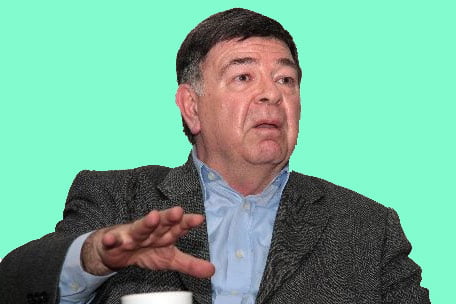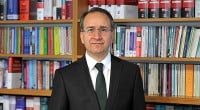My opinion on the book ‘Imam’s Army’

Date posted: January 1, 2012
Conspiracy theory is very widespread in Turkey, society is currently polarized. Those who share a positivistic and Islamophobic mindset refuse to recognize that religion can assume a positive role and hold the Gülen movement responsible for nearly all evil.
ŞAHİN ALPAY, Monday April 11, 2011
During my contacts with European parliamentarians, officials and Turkey experts in Brussels in the last week of March, I was posed questions about my opinion on the Fethullah Gülen movement in Turkey.
What did I think of the claim that the Gülen movement had infiltrated the entire judicial system and was controlling the police, prosecutors and judges that deal with the Ergenekon case? Was the Ergenekon case fabricated by the Gülen movement to silence the opposition to the Justice and Development Party (AKP) government? Was the journalist Ahmet Şık detained because he had written “Imam’s Army,” a book that substantiates such claims? The following are my responses in brief.
Islamophobia may not be as widespread in Turkey as in the West, but it is very strongly held in a rather significant part of Muslim-majority Turkish society. According to the mindset that has prevailed, especially among military and civilian bureaucratic elites ever since the founding of the Turkish Republic in the early 1920s, unless the state monopolizes and controls Islam and sets restrictions on religious freedoms, Turkey is likely to turn into another Saudi Arabia or Iran. This is why the Muslim religious brotherhoods that are based on popular interpretations of Islam have been banned since 1925; why Alevism, a heterodox form of Islam, the adherents of which form the largest religious minority, is not officially recognized; and why religious communities are not allowed to obtain legal personality. Turkey, however, is a predominantly religious society. Despite all bans and restrictions, religious brotherhoods and their offshoots in the form of religious communities or faith-based social movements continue to thrive by adapting to modernity. The popularity of the Gülen faith-based movement terrifies the Islamophobes.
Conspiracy theory is very widespread in Turkey, where society is currently polarized between those who basically demand the consolidation of democracy and those who favor the preservation of the military-bureaucratic tutelage regime. Many among the former tend to explain that all that happens as the workings of the “deep state” (or the Ergenekon criminal network), and among the latter as the plots of the “Gülen community.”
| Conspiracy theory is very widespread in Turkey, where society is currently polarized between those who basically demand the consolidation of democracy and those who favor the preservation of the military-bureaucratic tutelage regime. Many among the former tend to explain that all that happens as the workings of the “deep state” (or the Ergenekon criminal network), and among the latter as the plots of the “Gülen community.” Those who share a positivistic and Islamophobic mindset refuse to recognize that religion can assume a positive role and hold the Gülen movement responsible for nearly all evil. |
Fethullah Gülen is an Islamic scholar who represents an understanding of Islam that is compatible with modernity, that is democracy, secularism (meaning freedom of religion for all), human rights, respect for different beliefs and lifestyles and a market economy. He regards religion and science to be complementary and emphasizes the moral and social aspects of Islam. He calls on those who listen to his advice to start companies, open schools and hospitals, found charity associations and trusts to serve not only the people of Turkey but also humanity at large. He has consistently preached in favor of compliance with law and legitimacy. This is why he has acquired a mass following among people of all walks of life in Turkey, and why he is widely respected. But those who share a positivistic and Islamophobic mindset refuse to recognize that religion can assume a positive role and hold the Gülen movement responsible for nearly all evil.
The case against the Ergenekon criminal network is not at all fabricated to silence the opposition to the AKP government. That during the course of the investigation and prosecution of the case there have appeared practices not compatible with the rule of law does not a bit alter the fact that it carries great importance in terms of calling to account, for the first time in the history of the country, those involved in conspiring for and inciting the overthrow of an elected government. There may be individuals among police officers, prosecutors and judges that are involved in the Ergenekon case who respect Gülen, but the claim that they take their orders from Gülen or the Gülen movement not only conflicts with common sense but also carries no meaning other than an effort to undermine the case.
Why has Şık been detained, and why has his unpublished book been banned on charges of being an “organizational document” of Ergenekon? It is not possible to make a fair judgment on the question before seeing the indictment that has not yet been submitted. But it seems possible to say the following: Ergenekon is a diffuse criminal network that brings together various military and civilian elements with the aim of overthrowing the elected government. The suspects in the case are being prosecuted for violating the Anti-Terror Law on charges of stockpiling arms, preparing hit lists and committing murders. The law in question is, however, highly criticized for involving a very broad and imprecise definition of terrorism and membership in a terrorist organization, and thus is used to prosecute even individuals not directly involved in terrorism. What is urgently needed is a revision of the law to comply with democratic standards.
Source: Today’s Zaman http://www.todayszaman.com/columnist-240747-my-opinion-on-the-imams-army-the-book-banned-before-it-was-published.html
Tags: Defamation of Hizmet | Ergenekon | Turkey |
























